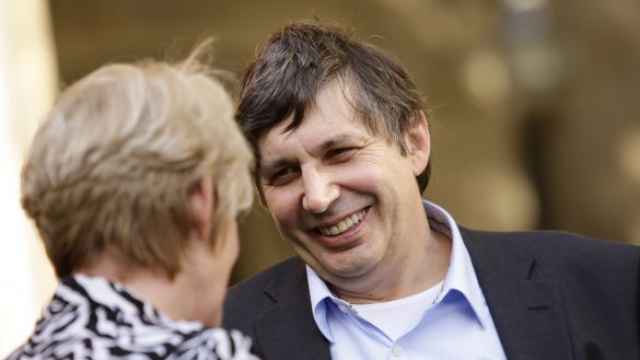Self-proclaimed inventor Viktor Petrik claims that he first discovered how to produce the unique material that won two Russian-born physicists the Nobel Prize this week.
Andrei Geim and Konstantin Novoselov, who live in Britain, received the prize for their work on graphene, which scientists say can revolutionize electronics and has a range of other possible applications.
But Petrik said he described the method to produce the graphene used by Geim and Novoselov long before they began their own research in the field in 2004.
He stopped short of accusing them of plagiarism, claiming only that he was first to develop the method.
Petrik also conceded that he was not familiar with the duo's further experiments with the material, which also were cited by the Nobel Prize Committee as the reason for the award.
Petrik made his claim in an interview published late Wednesday on the web site of United Russia, whose senior officials back his controversial inventions.
He appeared to be mainly targeting his chief nemesis, the Russian Academy of Sciences, which dismissed his inventions earlier this year as having nothing to do with science.
Petrik said his work on graphene received no publicity in the scientific community because of his status of a maverick, which has led the academy to refuse to publish his articles in professional journals.
“I think the current events are a disgraceful episode in the history of the Russian Academy of Sciences,” Petrik said.
Geim and Novoselov have not commented on Petrik's remarks. But Geim has declined a proposal to work in the Kremlin's innovation hub in Skolkovo.
The term “graphene” was introduced in 1987, but Geim and Novoselov are recognized as the first to actually produce the material. They beat rival researchers to the invention by mere months, and a number of alternative methods to produce graphene have been developed since.
A Message from The Moscow Times:
Dear readers,
We are facing unprecedented challenges. Russia's Prosecutor General's Office has designated The Moscow Times as an "undesirable" organization, criminalizing our work and putting our staff at risk of prosecution. This follows our earlier unjust labeling as a "foreign agent."
These actions are direct attempts to silence independent journalism in Russia. The authorities claim our work "discredits the decisions of the Russian leadership." We see things differently: we strive to provide accurate, unbiased reporting on Russia.
We, the journalists of The Moscow Times, refuse to be silenced. But to continue our work, we need your help.
Your support, no matter how small, makes a world of difference. If you can, please support us monthly starting from just $2. It's quick to set up, and every contribution makes a significant impact.
By supporting The Moscow Times, you're defending open, independent journalism in the face of repression. Thank you for standing with us.
Remind me later.





